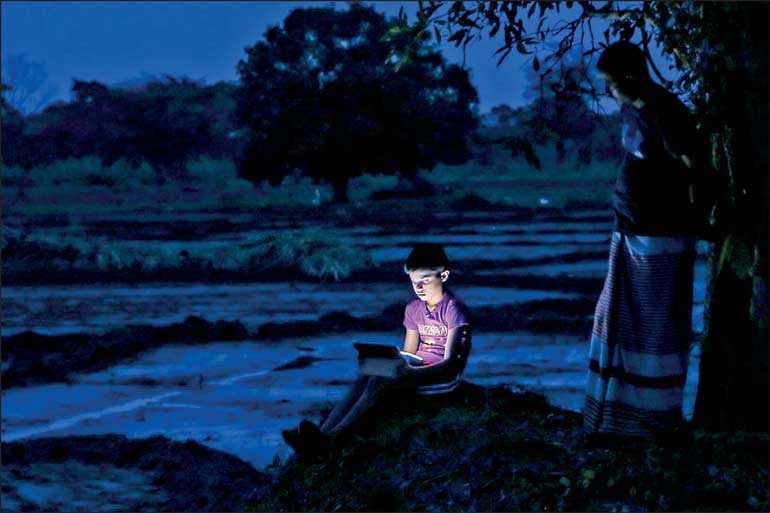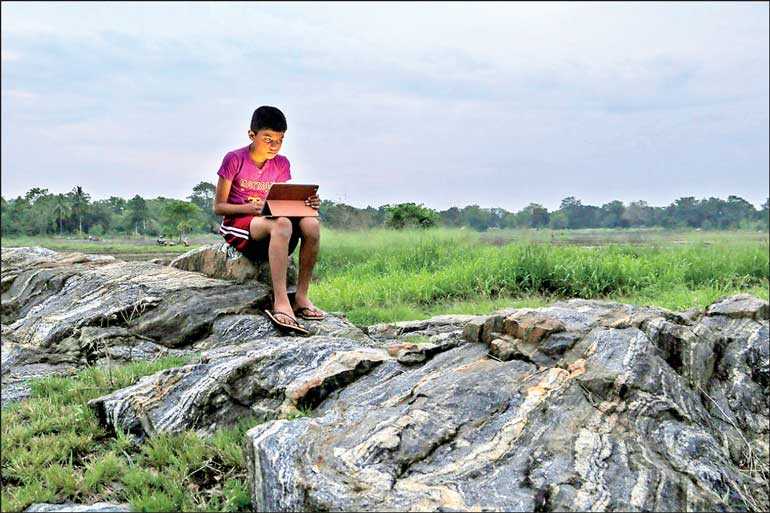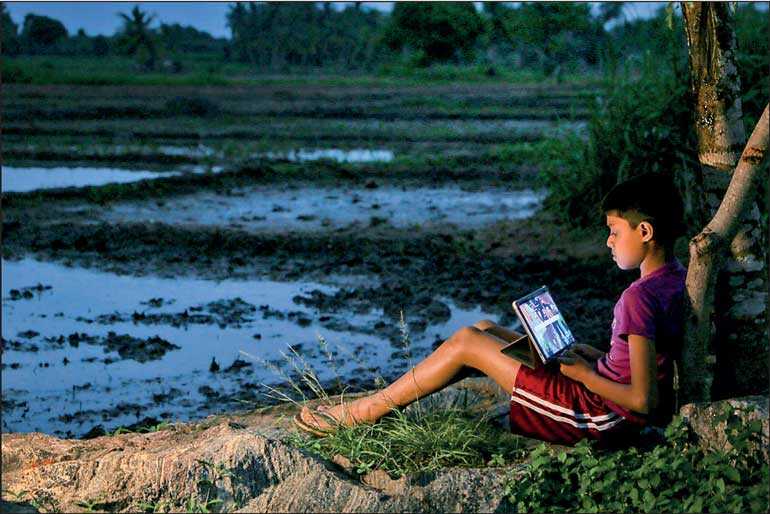Sunday Feb 15, 2026
Sunday Feb 15, 2026
Friday, 27 November 2020 00:00 - - {{hitsCtrl.values.hits}}

Induwara Pahansith (11) of Hurigaswewa Tambuttegama joins a Zoom lesson at dusk. As the only place which has the best wifi connection is in the middle of a paddy field about a kilometer away from home (Thammannawa), his Father has to accompany him and bring him back after each session. The family was forced to abandon their home in Bandaragama Galgamuwa sometime back due to human-elephant conflict.
By Dr. Malitha Wijesundara and Padmasena Dissanayake
On 20 January, the new batch of Grade 6 hostellers entered Royal College. On 6 March, the hostel closed for the Royal-Thomian cricket encounter and thereafter remained closed due to the COVID-19 lockdown.
On 18 March, the online lessons commenced. Soon after, we began inquiring into how many Grade 6 students were cut off from online lessons. Thanks to the exhaustive efforts of a coordinating parent, we found that seven students could not avail of the online lessons as they did not have adequate devices and one student could not be located as he had changed residences (due to human-elephant conflict) who had left no forwarding address. Hence, emissaries were sent to locate him and he was located on 19 June.
Setting out on a mission to secure devices for the aforementioned students, we were fortunate to receive sound advice and an extremely generous donation of five units from the very first person that we had contacted. Three more were donated by distinguished old boys. Equipped with devices costing Rs. 70,000 each, we successfully sourced ideal connectivity packages for one year, the cost of which was borne by donors from Melbourne and Brisbane.
Passionately supported by a young partner 20 years my junior at RC, we decided to deliver and set up these devices for each student, living in different parts of Sri Lanka. This resulted in a personal journey of discovery as I learnt that these brilliant stars not only came from the remotest parts of the island but were focused and committed despite many challenges they had to face in everyday lives. It was heartening to see that notwithstanding the numerous trials and extenuating circumstances, these kids had tremendous support and guidance round the clock by parents and teachers to become our ‘Nation’s stars’ at the Grade 5 scholarship examination to enter Royal College.
Initially our objective was just to set the devices up ensuring they could continue with online classes. Once we visited them and looked around, we realised how much they needed continued guidance and supervision. When we saw how determined each one of them was and how much they lacked professional help we decided to stay glued to them. True, our first thought had been to put a decent devise in their hands so that they wouldn’t be left behind due to financial challenges. Then another thought hit us; could this become a nationally important experiment – a ‘Tab’ in the hands of a 10-year-old boy changing a life completely? Opening up the universe to him taking him to heights he never knew existed? Making him totally independent and confident veering him totally off the tuition culture and dependency? Making him not just a national leader but a global citizen bringing honour and respect to the country that birthed him? Could this be a rare benefit only a pandemic could bring?
Distribution of the eight tabs took place on 2, 3 and 5 August covering a spectrum of 1,000 kilometres across our country. The students were located in North Western, North Central, Uva, Sabaragamuwa and Southern provinces – in remote areas where accessibility was at times on foot due to the non-motorable and mountainous foot paths leading to their homes. The Tabs had 4G capacity with both Dialog and Mobitel connections so that based on available coverage the best connection could be provided. Each student was given a short orientation on how to operate the Tab, a Gmail address, essential bookmarks, video lessons (including Khan Academy), etc. In some locations as the coverage was non-existent, the student had to be taken to the village temple where there was 4G coverage for this orientation and training.
Each connection was pre-loaded with Rs. 600. Where there was Dialog connectivity, the Work and Learn package was activated which provided 35 GB of data for Rs. 495 + taxes per month. Where there was Mobitel connectivity, 25 GB Learn package was activated for Rs. 160 per month in addition to an Unlimited YouTube package for Rs. 250 per month. The balance amounts were converted to Anytime Data. The idea was to have the ability to use Zoom, learn using YouTube videos and the ability to visit any educational content included on the Cloud Smart School portal of Royal College without any financial burden to the students and their parents.
From 16 August we commenced a weekly educational session, which was held using Zoom coordinated via a WhatsApp group. The first session focused on Grade 6 Mathematics supported by the video lessons on DP Education. The students were asked to try out the online quiz on the e-Thaksalawa website developed by the Ministry of Education. The students were quick to learn the process and were soon able to follow the lessons and complete the quizzes on their own.
As the second step, we introduced the ICT curriculum in the English Medium supported by online video lessons and the online text book and work book published by the Educational Publications Department. Initially the students found it difficult to follow these lessons due to the medium of instruction, delivery and assessment. This had to be then taught in Sinhala during online sessions though they were made to complete the workbook activities in English. Although the progress was slow, by the end of September, the ICT curriculum was completely covered and the students are now experimenting on how to develop computer programs using Scratch.
Since the weekly sessions commenced, it was clear that some locations required better connectivity. Some Zoom conversations were not audible due to poor bandwidth resulting from weak coverage by respective ISPs. Thus, it was necessary to visit students in Ambanpola, Hurigaswewa, Aralaganwila and Wanduraba to donate 4G routers. For Aralaganwila and Hurigaswewa, additional antennas had to be installed in order to improve reception. In some locations, the ISPs had to be switched.
After two months (from the initial distribution of Tabs), all eight students were able to have a comfortable video conference on Zoom supported by stable bandwidth. It must be noted that, up to this point some students had to travel from their homes to locations with better reception – this was done often at night when educational sessions took place. It was heartening to see the commitment by the parents to get their sons connected to the educational activities and the effort made to overcome all obstacles including connectivity issues.
School commenced shortly after the distribution of tabs which meant that the students had to leave the tabs behind at homes as it was felt the devices may not be safe in the hostel. This restricted the educational sessions to weekends. However, due to the recent second wave of COVID-19, the students have got another opportunity to make good use of the Tabs and to learn from home. School has fully switched to Zoom based teaching while our own educational sessions are now conducted twice a week. From mid-October, every month, an overseas family will have a video conference with these students, in an attempt to give them international/global exposure. In addition, Sri Lankan experts living overseas will mentor these students which will undoubtedly inspire them to not only maximise on their learning experiences but help them grow into young men who will in turn serve and inspire life around them.
It is our wish to see these eight students achieve their fullest potential at school and in their lives. We are convinced that these Tabs have provided them with a life changing experience!

